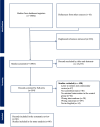Participant characteristics in the effectiveness of lifestyle interventions to optimize gestational weight gain: a systematic review and meta-analysis
- PMID: 41136661
- PMCID: PMC12552448
- DOI: 10.1038/s43856-025-01049-5
Participant characteristics in the effectiveness of lifestyle interventions to optimize gestational weight gain: a systematic review and meta-analysis
Abstract
Background: Precision prevention involves tailoring interventions to the unique characteristics of a group or individual to maximize their effectiveness. In this study, we examined the role of participant characteristics in the effectiveness of lifestyle interventions to optimize gestational weight gain (GWG).
Methods: We searched Medline, Embase, and PubMed, from inception up to March 2025, to identify randomized and non-randomized controlled trials of lifestyle interventions (diet, physical activity, or combined) commencing before or during pregnancy. Participant characteristics, including age, race/ethnicity, body mass index (BMI), employment status, fasting low- and high-density lipoprotein cholesterol (HDL-C) were assessed. Mean differences (MD) in GWG were pooled using the random-effect model. Meta-regression and subgroup analysis were conducted by participant characteristics (e.g., BMI).
Results: A total of 86 studies with 28,270 participants were included in this systematic review and meta-analysis. All lifestyle intervention types significantly reduced GWG. Combined lifestyle interventions initiated at first (MD -0.68; 95% confidence interval [CI]: -1.28, -0.07) and early second (13-17 weeks) trimester (MD -0.83; 95% CI: -1.46, -0.20) provide better effectiveness in optimizing GWG. Diet-only interventions significantly reduced GWG only in participants with normal BMI (MD -1.33 kg; CI: -1.75, -1.91) compared to the other BMI categories. Combined diet and physical activity interventions reduce excessive GWG in women with higher baseline HDL-C (β -0.04; 95% CI -0.06, -0.01).
Conclusions: Lifestyle interventions reduced excessive GWG, with possible differential effects by intervention initiation time, BMI, and HDL-C. Future studies should consider physiological as well as social characteristics, in line with a holistic framework for precision medicine.
Plain language summary
A growing body of evidence underscores the pivotal role of lifestyle intervention in reducing the risk of excessive weight gain during pregnancy and associated maternal and child health complications. However, instead of a one-size-fits-all approach, further research is needed to help differentiate how to optimize the effectiveness of these interventions based on individual physiological and social determinants. This study found that lifestyle interventions reduce excessive weight gain during pregnancy, with greater benefits for certain women, including those with a normal body mass index and higher high-density lipoprotein cholesterol (good cholesterol) levels at the beginning of lifestyle interventions. Non-stratified data reporting prevented us from examining other pertinent participant characteristics, and future studies are required to inform precision intervention approaches that benefit all women.
© 2025. The Author(s).
Conflict of interest statement
Competing interests: The authors declare no competing interests.
Figures
References
-
- Song, C., Li, J., Leng, J., Ma, R. C. & Yang, X. Lifestyle intervention can reduce the risk of gestational diabetes: a meta-analysis of randomized controlled trials. Obes. Rev.17, 960–969 (2016). - PubMed
Grants and funding
LinkOut - more resources
Full Text Sources


